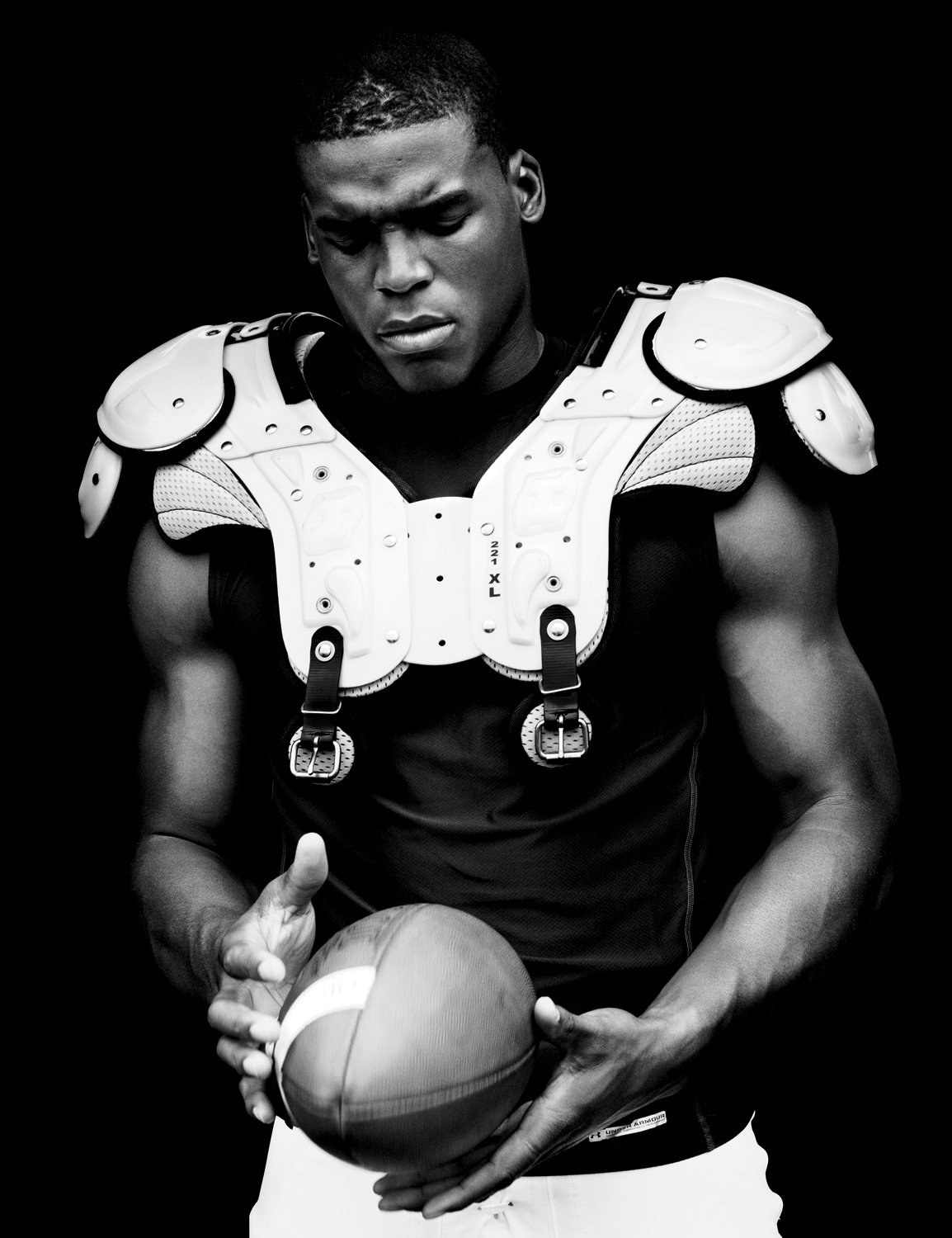Cam Newton
In this day and age, everybody wants to be that star. Of course, people are going to say, ‘He’s immature. He doesn’t deserve this.’ But when people see you do alright, then you start winning their hearts.Cam Newton
Cam Newton is living under a microscope, which is never comfortable. But when you’re a six-foot-six-inch, 250-pound slab of genetically gifted, precision-honed muscle—and an exceptionally talented slab of muscle who won college football’s highest honor, the Heisman Trophy, and was selected first overall in this year’s NFL draft—the scrutiny can be intense. It’s not for nothing that this past July the 22-year-old Newton, a quarterback out of Auburn University, signed a four-year deal with the Carolina Panthers worth more than $22 million (or roughly $1 million for every year he has been alive). Newton’s new employers, as well as the lineup of brands at his doorstep with endorsement deals in hand, are expecting big things: In fact, before Newton ever even played in a professional game, he’d already secured a contract estimated to be worth more than $1 million per year with sportswear giant Under Armour, placing him in the company of worthies like Tom Brady.
However, to paraphrase noted traveler Hunter S. Thompson, “You buy the ticket, you take the ride,” and Newton’s trip to the pros has been fraught from the beginning. The ink was barely dry on the Under Armour agreement when the quarterback ignited controversy last February following an interview with Sports Illustrated writer Peter King, who shortly after his talk with Newton, tweeted one of the rookie’s particularly revealing statements: “I see myself not only as a football player, but an entertainer and icon.” That might not sound like much—just a glimpse into the thought process of a kid primed to play pro ball amid a fog of expectations, hype, and dollar signs, and very reasonably struggling to make sense of it all—but in the ultra-conservative world of the NFL, the quote had the effect of pouring gasoline on a fire. To make matters worse, the interview occurred in the aftermath of a year in which Newton was forced to weather accusations that he and his dad, former Dallas Cowboys strong safety Cecil Newton, were involved in a college football pay-for-play scheme. That scandal nearly kept the Heisman out of Newton’s reach, but in December, the NCAA declared him eligible to play. (In the same investigation, the NCAA committee charged with overseeing the case found that Newton’s father had sought cash in exchange for his son’s services, but deemed that there was insufficient evidence that the younger Newton knew what the elder Newton had been doing.)
Now, though, with the NFL season upon us, the focus has shifted to what Newton can do on the gridiron. We spoke with him the morning after his first professional start, a preseason game against the Miami Dolphins, in which he completed just seven of 14 pass attempts, managed just three first downs, and threw for just 66 yards as the Panthers fell 20–10. Like many well-paid athletes, Newton knows to choose his words wisely, but when we spoke, he was in good humor—and surprisingly candid about his inauspicious debut and the peculiarities of making a living being chased around by 300-pound men. The icon stuff? He says that can wait—which is, of course, exactly the attitude that turns football stars into football heroes.
JONATHAN DURBIN: How are you feeling after last night’s game?
CAM NEWTON: Everything’s good. Of course, I didn’t get to win, so that bothered me, but it’s just the preseason and I’m still learning. I’ll watch the film, learn, and hopefully I’ll get better. I’m not going to rush anything.
DURBIN: I know it’s very early on in your career, but what differences have you found between college and the NFL?
NEWTON: The defense’s velocity, man—everybody’s so fast. You see yourself running around out there, getting chased by 300-pound linemen . . . In college, typically, you can run faster than those guys to get yourself out of trouble, but I don’t think I’ll be able to get out of it like that now. [laughs] It’s their job! In college you had to worry about that math class or this exam that’s coming up on Tuesday, but not in the professionals. You eat, sleep, and do everything related to your craft—and your craft is football. You can be at it from sunup to sundown.
DURBIN: I see—no distractions. So as you’re moving into the season, what are you focusing on?
NEWTON: I’ve got to grow up fast. You’re not talking to freshmen anymore. You’re not trying to get them on board, saying, “Hey, man, let’s get out there.” Now you’re talking to grown men, and they’re like, “Man, I gotta get my kids outta daycare,” and “I gotta take my wife out to dinner.” It’s different. It’s real. You don’t have to motivate them as much. I’m working on understanding my role.
DURBIN: You’re only 22 years old and you’re suddenly in a very intense leadership position. Is that intimidating?
NEWTON: Ummm . . . Not really. That’s just something that comes natural in a person. The hard part is that you’re always in the spotlight. Oftentimes I see myself on TV, and it’s like, “Man, what have I become?” I used to hope I was gonna be on TV, hoping people would see me playing football. Now, I’m being critiqued at the highest level—you know, “Cam didn’t do that right. He didn’t do this right.” Which is fine, but there’s no off switch. If I go downstairs right now and cuss out somebody, it’s going to be on ESPN tomorrow, you can believe that. That’s the difference.
DURBIN: You feel like you can’t make a move without being watched.
NEWTON: In this field, people know how much you’re worth—meaning X amount of dollars, or that you’re on TV this much. You have to respect that you are not regular anymore. And when I say “regular,” I don’t mean that I’m better than you are, I mean that everybody’s watching. In this day and age, everybody wants to be that star. Of course, people are going to say, “He’s immature. He doesn’t deserve this.” But when people see you do alright, then you start winning their hearts. It’s not going to come easy, though. It doesn’t matter how many people you do right, you’re still going to be hated by so many others. You can’t live your life trying to make everybody happy.
DURBIN: So you’d say the best way to deal with all the criticism is by ignoring it?
NEWTON: Well, I’d be lying to you if I said I don’t look at the TV or listen to what people say. I’d be a fool if I didn’t. I don’t break my neck going on Yahoo Sports or Twitter, but, you know, you’re on TV, you’re in the newspapers. So many people are talking about you, and you don’t understand what effect you’re having on them. You have a lot of fans who you don’t know, who you’ll never know, and you’ve got a lot of people wishing for your failure. You have to be mindful of the decisions you make, from the people that you go out with to the pictures that you take with fans. It’s a platform that could easily be taken away.
I don’t want to dress like a football player. I don’t want a person to look at me and say, ‘Oh, that’s tacky. You dress like a football player—you don’t care.Cam Newton
DURBIN: Is it different from what you’d imagined?
NEWTON: See, that’s the thing. I don’t say, “I’m gonna go out now, and I know people are gonna be looking at me.” I don’t want to be the center of attention, which is ironic. I hate having all eyes on me—unless it’s for my job, and my job is playing football. I’m not that attention-hungry. But as a professional athlete, you have to have that in the back of your mind. Word of mouth travels faster than anything else.
DURBIN: When Peter King interviewed you for Sports Ilustrated, you told him that you see yourself not only as football player, but an entertainer and an icon. What does that mean to you?
NEWTON: I was confused and frustrated because a 30-minute interview was really squeezed into one sentence. It goes to show you the environment that you’re in. Everything that you say, everything that you do, you have to think about before you say it. People don’t understand that it wasn’t just a 10-minute interview. We were on the phone talking about a lot of things, ranging from my collegiate level to the things I’m looking forward to in the NFL. The question that he asked, I really didn’t think it was as bad as what he made it out to be. I just learned so much from it. It made me become better aware of my surroundings.
DURBIN: But is that how you see yourself? As an icon and entertainer?
NEWTON: No, man. My number one goal right now is being a football player. A wise man once told me, “If you take care of your number one goal, then everything else will take care of itself.” Control what you can control. Don’t lose sleep worrying about things that you don’t have control over because, at the end of the day, you still won’t have any control over them.
DURBIN: How would you describe your leadership philosophy?
NEWTON: Just be yourself and stand up for what you believe in. As a quarterback, you’re never off. A lineman can go home and be with his family or just go and do whatever he wants to, but the quarterback is the leader of the team. That’s the responsibility I have. There’s some good and some bad with that, but, you know, mostly good.
DURBIN: You were raised in Atlanta, right? What was that like?
NEWTON: Growing up in Atlanta was big for me. It will always be a city that I love and I will always call it home. My parents didn’t make a lot of money, but I never went to sleep hungry. Nowadays, I sacrifice the time I need to look back and know that those are my humble beginnings. Those are my roots, and if you don’t know your roots, man, there’s no telling what you’re returning to.
DURBIN: Atlanta is a good town for music. What do you listen to?
NEWTON: I like so many genres. The top of my list is Lil Wayne, Jay-Z, and a lot of Atlanta rappers, like Gucci Mane, but I also listen to The Fray, Beyoncé. Listening to music is big in my life. From Marvin Gaye to the Jackson 5 to Stevie Wonder—all those guys, man. I mean, you look at my iTunes list, and the number of songs that I have, it’s well over 8,000 songs.
DURBIN: Whose style do you admire?
NEWTON: The most successful people I admire don’t carry their jobs with them off the field. I don’t want to dress like a football player. I don’t want a person to look at me and say, “Oh, that’s tacky. You dress like a football player—you don’t care.” I want to dress, you know, relatively nice and clean, you know? Not baggy, not loose. I want everything to be flush and neat.
DURBIN: I caught the feature that you did for GQ. You looked good.
NEWTON: And that was really, really flush, really tight, you know? I got a lot of comments for that.
DURBIN: You played football with your older brother, Cecil Jr. [now a center for the New Orleans Saints], as kids, right?
NEWTON: I did—and I had to. One year, I played organized football with him. I was in ninth grade and he was a senior. I was lucky enough to start as varsity quarterback and he was my center. You know, even right then I had to grow up fast. Here I am, what, 14, 15 years old, leading a team full of guys that are 17, 18, about to go to college.
DURBIN: When did you know that football was what you wanted to do?
NEWTON: I grew up trying to be like my idols, and one of the main people in my life was my father. He played football, and when your father is telling stories about the game he played . . . Everybody wants to be like their father.
DURBIN: What lessons did you take from him?
NEWTON: My father always taught us that anything you want, you’ve gotta go get it for yourself. Nothing’s going to be given to you, and don’t expect something for nothing. I remember being outside, planting trees, watering lawns, cutting grass. Hard work. A funny story: When the high-school coach asked me to play varsity basketball, I said, “Pops, coach wanted me to try out for the team!” My father teased me and said, “Well, you need to get done with this job to have some time to play.” That kept me motivated to finish as fast as I could. But I always had to bring my basketball stuff and my football stuff and go straight to practice, sweating in my boots and jeans. My teammates would be like, “Where in the world are you coming from with all that grass in your shoes?” But I guess I had the last laugh, because it paid off. I can look back and say, “Man, I came a long way.”
Jonathan Durbin is a New York City-based Writer.







